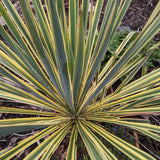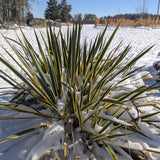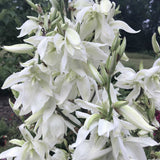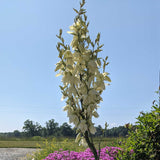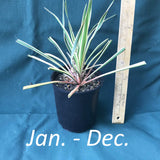Sporting sword-shaped evergreen leaves edged in creamy-yellow, Bright Edge Yucca provides year-round interest and makes a striking, deer-resistant and drought-tolerant specimen plant.
- Evergreen leaves
- Plants are very drought tolerant
- Deer resistant
Details
- 12 to 18 in. tall (up to 60 in. when in flower) and 36 in. wide
- Blooms in late spring, bearing striking white bell-shaped flowers
- The tips of the leaves have a sharp point, but the leaves themselves are flexible and easy to handle and work around
- Hardy in USDA hardiness zones 5, 6, 7, 8, and 9
Flowering period
Flowering begins in May in central North Carolina and lasts two to three weeks. Flowers are visited by a wide array of pollinators.
How to grow
Yucca is best grown in full sun, but will tolerate partial shade. Thrives in almost any soil that doesn’t stay wet. Its tolerance for drought is legendary.
Care and maintenance
Adam’s needle is a truly low maintenance plant that thrives on neglect.
Where to plant
A great choice for sunny, well drained locations, dry, exposed gardens, and at the beach.
When to plant
Establishes quickly. Can be planted anytime throughout the growing season.
Spacing
If planting in a group, space plants around three feet apart.
When will my plant flower?
Plants may take a couple of years to flower after they are planted.
Native habitat and range
Yucca filamentosa can be found growing at the edge of woodlands, roadsides, and dunes from New Jersey south into Georgia and Mississippi.
Source and origin
Our plants are propagated by root cuttings here at the nursery.
| States | Orders up to $50 | Orders $51 to $100 | Orders over $100 |
| AL, DE, GA, KY, MD, NC, OH, PA, SC, TN, VA, and WV | $16 | $18 | $20 |
| AR, CT, FL, IL, IN, LA, MA, MI, MO, MS, NH, NJ, NY, RI, VT, and WI | $18 | $20 | $22 |
| IA, KS, ME, MN, OK, and TX | $20 | $22 | $24 |
| CO, NE, ND, and SD | $22 | $24 | $26 |
Sorry, we can't ship plants outside of the continental United States or to AK, AZ, CA, ID, NM, NV, OR, UT, and WA due to agriculture restrictions.
We now ship Sarracenia plants bareroot (while dormant during the winter) to Western States. Please contact us with your zipcode for a shipping quote.
When will my order be shipped?
All plants are shipped within two weeks of placing an order.
Is it okay to plant in the winter?
Yes, as long as the soil is not frozen. Planting native perennials in winter and early spring gives your plants a head start before the summer heat arrives.
What if it’s too cold to plant where I live, but I want to buy a plant before it sells out?
Dormant plants can safely be kept in a basement, garage, or cool room until you are ready to plant in late winter or early spring.
How will my plants get delivered?
Most orders are shipped on Monday or Tuesday with either UPS Ground, USPS Ground Advantage, or USPS Priority Mail, which depending on the destination takes between 1 to 4 days.
Are your plants shipped in their containers?
Yes, all our plants are shipped in their growing containers. The majority are grown in containers that are 4.5 inches wide by 5 inches deep and 32 fl. oz. / 946 ml in volume.
Do you guarantee your plants?
We guarantee our plants to be healthy, ready for planting and correctly named. We are not able to guarantee whether a plant will grow in your garden as there are too many circumstances that are beyond our control.
On rare occasions, a plant shipped dormant may fail to emerge from its dormancy. If this happens, please let us know. If you are concerned about a plant, please contact us within 14 days to let us know. If we can’t help you make it grow, we’ll send you a new plant or issue a refund.
Can I return my plants?
You can return your plants if you no longer want them once they arrive. To receive a refund (minus 20% restocking fee) the plants must be returned in good condition. Return shipping is the customer’s responsibility.
Can I cancel my order?
Yes, you can cancel your order. Please visit our terms and service page for details.
What about sales tax?
We propagate our own plants and are not required to collect North Carolina sales tax.
Where can I find information about your plants?
Here are some FAQ on how we grow plants.






